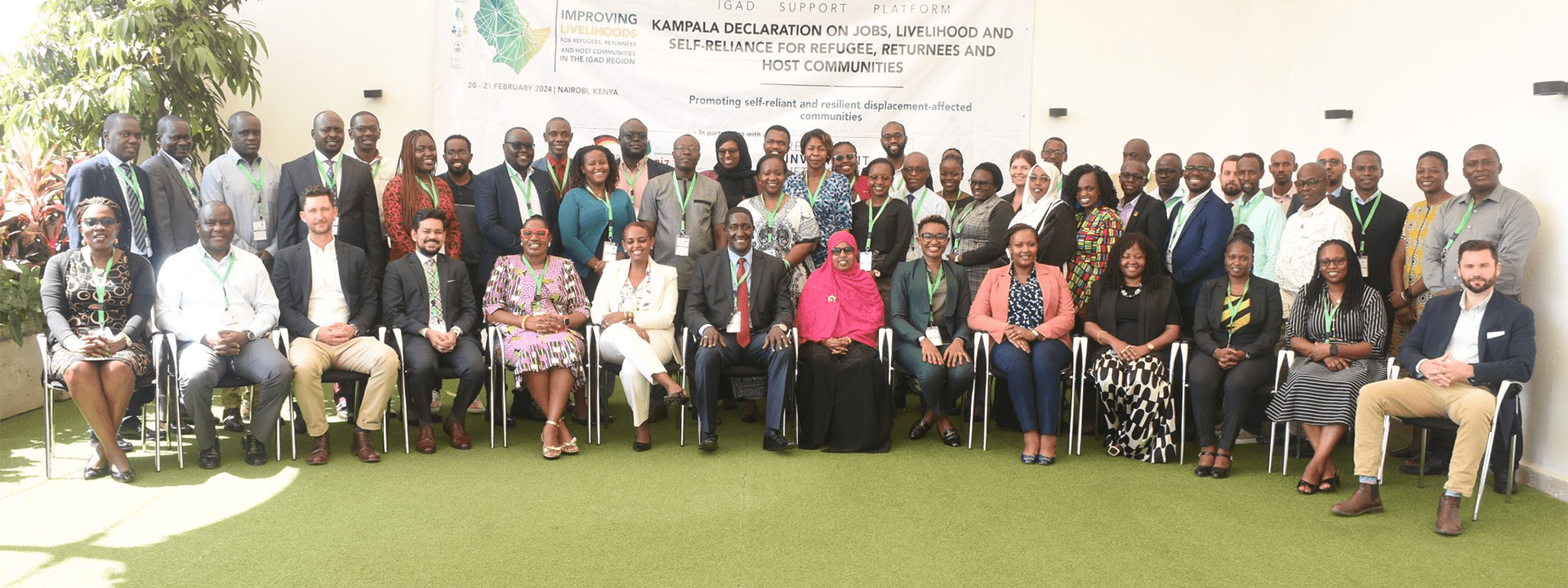February 20, 2024 (NAIROBI, Kenya): The IGAD Secretariat in collaboration with the Department of Refugee Services of Kenya (DRS) organised national-level consultation on the Kampala Declaration on Jobs, Livelihoods, and Self-Reliance of Refugees, Returnees and Host Communities.
The consultations brought together different Government line Ministries Departments and Agencies as well as local government refugee hosting areas, representatives from the private sector and refugees’ groups in Kenya to raise awareness and enhance greater engagement and partnership between the public and private sectors to achieve the Declaration and Plan of Acton’s objectives.
Opening the meeting, Dr. Fatuma Adan, IGAD Head of Mission to Kenya called upon the government departments, refugees, development partners and private sector to come up with concrete opportunities for investments to improve the living conditions of refugees and their hosting communities.
She called upon partners to make the Kampala Declaration a reality to ease pressure on host countries in a context of decreasing humanitarian support from partners and donors.
Mr. John Burugu, Commissioner for Refugee Affairs at the Department of Refugee Services, Government of Kenya said that the refugee population continues to increase in Kenya due to conflict and climate change across the borders.
“Climate change has triggered and contributed to the influx of refugees into the country with most of the refugees coming from the Somalia and South Sudan.”
Mr. Burugu said that Kenya had registered significant progress in its policy interventions towards displaced communities since adopting the Kampala Declaration and its plan of action. He cited the Refugees Act of 2021 which introduced comprehensive legal measures granting refugees additional rights, protection, and opportunities for social and economic inclusion for refugees.
He also cited the September 2023 gazettement of six refugee documents by the Cabinet Secretary for Interior and National Administration including the Asylum seekers pass, proof of registration, movement pass, letter of recognition, refugee ID and Conventional Travel Documents to be used by refugees and asylum seekers to seek and access government services and other services from the private sector.
On private sector engagement in Kenya, Mr. Burugu cited the intervention of Inkomoko, an international financial service provider supporting entrepreneurship of 1200 refugees and host communities in Kakuma refugee camp and expanding to urban refugee areas. Financial institutions such as Equity Bank Group and Kenya Commercial Bank had expanded their services into the refugee camps and settlements.
The national consultation attracted different private sectors working in the displacement setting in Kenya. Through interactive session potential barriers and opportunities for increased private sector investment were noted. In collaboration with the Refugee Investment Network (RIN), a concrete road map will be developed to guide investment in Kenya.
The Coordinator for the Kampala Declaration at IGAD, Ms. Yemisrach Benalfew established that the Declaration has 5 pillars: enabling environment of policy and legislative framework; private sector and civil society engagement to provide jobs and livelihoods to refugees; return and reintegration; natural resource management to address conflict on limited resources using the already existing local community structures; and coordination, monitoring and resource mobilization, which is a function of the IGAD support platform.
She affirmed that implementation of the Kampala Declaration requires a multi stakeholder, multi-agency approach revolving around the key pillars both at national and sub-national levels, all working to realise that self-reliance of refugees.
One of the major highlights of the meeting was the launch of the Monitoring and Evaluation framework, developed by IGAD, to help track governments’ commitment on the implementation of the Declaration.
The framework will allow the IGAD Secretariat and Member States to make efficient periodic assessments about progress towards attainment of outcomes and impacts and identify areas that would uphold upward and downward accountability.
The implementation of the Kampala Declaration is supported under the Strengthening IGAD Migration and Displacement Policy Implementation Project (SIMPI) that is funded by GIZ on behalf of the German Federal Ministry for Economic Cooperation and Development (BMZ).

